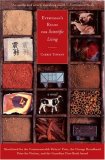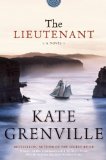Summary | Excerpt | Reviews | Beyond the book | Read-Alikes | Genres & Themes | Author Bio

A Novel
by Carrie TiffanyEveryman's Rules for Scientific Living is a deceptively
simple first novel narrated by Jean who meets Robert while working on board the
Better Farming Train as a seamstress educator. Robert's ideology embodies
the spirit of the train, and of the era - he is convinced that science can
conquer all and before long the newly-weds are setting up home in the Mallee
(see sidebar) so that he can prove his theories in this particularly unforgiving
landscape. Before long the cracks in his ideology begin to show, theory is
one thing, the Mallee is another.
Throughout, Tiffany (an agricultural journalist living in Melbourne) explores
the themes of man against nature, and the nature of man against man, but she
also captures a big slice of social history, illustrating the incredible
hardships of the time - the great depression, extensive years of drought, the
memories of one war still present and the impending onset of another - stories
that are at one level uniquely Australian but at another level, totally
universal.
If you've enjoyed books such as Water for Elephants or The Worst Hard Time this could be one for you.
Did you know?
The British government's efforts to educate farmers
spawned the longest running soap opera in history, a BBC radio show.
The Archers
first went on air in 1951, and still broadcasts for 15 minutes a day, 6 days a
week to this day dispensing useful nuggets of farming information along with its long running storyline.
It's not just British farmers that the BBC educates via the radio. Back in 1994 the BBC
World Service started to broadcast a radio soap opera to Afghanistan called
New Home, New Life , the show weaves together tales of love, comedy and human suffering along with tips on animal husbandry. An estimated 35 million people listen to each show!
Talking of BBC Radio; BBC Radio 4 offers a tremendous variety of radio plays, book readings (usually abridged from the original) and discussion on every topic under the sun. Most of the programs are stored online so if it's not convenient to listen live you can enjoy the recordings anytime in the week following broadcast. For example, this week's "Book at Bedtime" is Engleby by Sebastian Faulks, the Book of the Week is Peeling the Onion by Gunther Grass, and the Afternoon Reading is a series of five crime stories written by leading women writers.
![]() This review was originally published in The BookBrowse Review in August 2006, and has been updated for the
July 2007 edition.
Click here to go to this issue.
This review was originally published in The BookBrowse Review in August 2006, and has been updated for the
July 2007 edition.
Click here to go to this issue.

If you liked Everyman's Rules for Scientific Living, try these:

by Kate Grenville
Published 2010
Winner of the Christina Stead Prize for Fiction, Kate Grenville's The Lieutenant - a stunning follow-up to her Commonwealth Writers' Prize-winning book, The Secret River, is a gripping story about friendship, self-discovery, and the power of language along the unspoiled shores of 1788 New South Wales.

by Cate Kennedy
Published 2008
Devastating, evocative, and richly comic, Dark Roots deftly unveils the traumas that incite us to desperate measures and the coincidences that drive our lives. This arresting collection introduces a new master of the short story.
There is no worse robber than a bad book.
Click Here to find out who said this, as well as discovering other famous literary quotes!
Your guide toexceptional books
BookBrowse seeks out and recommends the best in contemporary fiction and nonfiction—books that not only engage and entertain but also deepen our understanding of ourselves and the world around us.